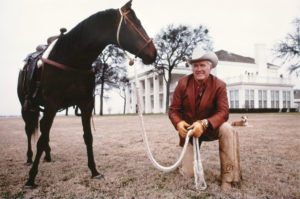
Cloyce grew up in a sharecropping family during the Great Depression on a small cotton farm in Jonesboro, Texas. He and twin brother Boyce were 6 when the stock market crashed in 1929. Douglas said his father did everything he could to further his education, and one thing that may have saved him from poverty was his great athletic ability.
During his junior year at West Texas State in 1946, he was drafted by the Washington Redskins. Though he made the team, he decided to go back to school. He graduated with a business degree in 1948, the same year Washington traded away his rights to the Detroit Lions for $250.
In 1942, he and Boyce joined the Marines, where he earned an engineering degree. After the war, he played professional football, returned to duty during the Korean Conflict, and then spent his seasonal downtime earning a law degree from Baylor University.
Fort Worth businessman Lee Johnson, owner of Johnson Capital Management, said his Uncle Cloyce was larger than life.
“I had such an admiration for him,” Johnson said. “You knew this guy had a greatness. There was something special about him. When he looked you in the eye, he had your attention.”
Johnson said spending time with Cloyce was surreal for him as a teenager.
“I got to go with Uncle Cloyce one time, just he and I,” Johnson said. “He had to go to Sacramento to the legislature. We go to the airport out at Addison, and his pilot is there. … It was a Learjet.”
Johnson, who still seemed somewhat awed over the whole ordeal, said he was just a pimply faced kid whose legs were too long for his pants when he pulled one of the jet’s window shades down to reveal “a picture of the Box boys, each one riding their favorite horse, painted onto the pull-down.”
Johnson talked about how his mother, Wilmuth, Cloyce’s baby sister, had stayed and taken care of her ailing mother, Zelma “Granny” Box, after everyone else had left home.
“During the Depression, they lived alone without a man around,” Johnson said. Cloyce and Boyce “would send money back, bring money back. Those two guys … were her heroes.”
Wilmuth later married Lester Johnson, who worked in the cement industry and bought the family a lake lot in Weatherford, where the Box boys would occasionally visit.
“They had four boys, and we had three,” Johnson said. “You get seven guys together around a lake, it was a lot of fun.”
Johnson said visiting his Box cousins was like traveling to a different world.
“They were rich,” he said. “I don’t know how else to put it. Their life was a lot more formal. There were times we had to pour water out of a 5-gallon bucket into the toilet to flush it. I don’t think they ever did that at Uncle Cloyce’s.”
Cloyce was a focused man who believed in hard work, Johnson said. Although the sun doesn’t go down until about 9 in the summer here, Johnson said Cloyce would not quit working “until dark thirty.”
Douglas said Cloyce “had no quit in him. If he had, our family would be in a lot different situation these days.”
******












Where may I purchase Fort Worth Weekly in Dallas, tx or McKinney, tx?
Pls. let me know where I may purchase Fort Worth Weekly in Dallas, tx?
thanks, Polly
The Weekly is free at at many locations in Fort Worth, all around the city. Maybe you have someone that there that will mail them to you?